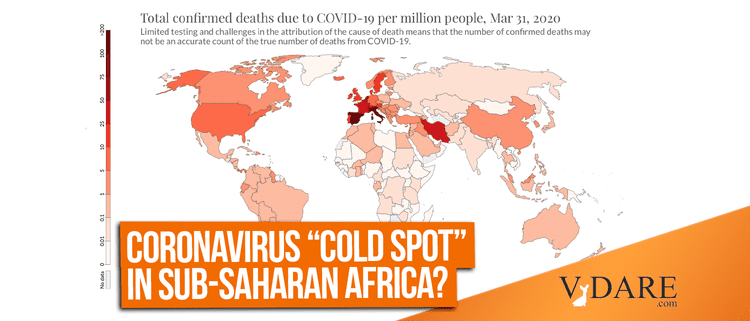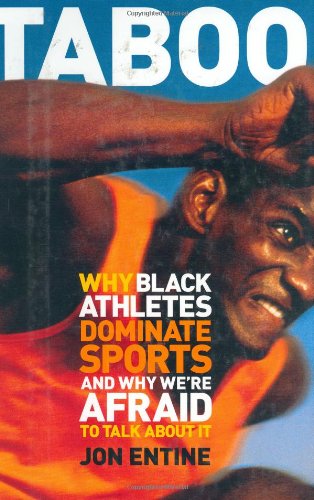
By Lance Welton
04/02/2020

We are getting perilously close to being allowed to discuss race and ethnic differences in susceptibility to Covid-19 — ironically, in part because leading Democrats are sniffing for “racism.” Jon Entine, who first became prominent 20 years ago with his book on race and sport Taboo: Why Black Athletes Dominate Sports and Why We’re Afraid to Talk About It, has broken cover in a co-authored article on the website of his Genetic Literacy Project [What’s ‘race’ got to do with it? Most of sub-Saharan Africa emerges as coronavirus ‘cold spot’, which may offer clues to finding COVID-19 vaccine, By Jon Entine & Patrick Whittle, Genetic Literacy Project, March 31, 2020]. Perhaps this will do for the race-disease nexus what his book did for the race-sport nexus; that is, compel the Main Stream Media finally to talk about it.
Back in 2001, Entine actually wrote about Taboo’s findings for VDARE.com, his article having been originally commissioned by the Boston Herald before being pulled for the usual cowardly reasons. But twenty years of Politically Correctness has clearly taken its toll on Entine: he does a fair amount of grovelling in this new article.
Thus, after asking the perfectly sensible question “Do diseases discriminate on the basis of race?” Entine feels compelled to write:
this may seem like an inflammatory question, bringing together the loaded term “discriminate” and the contentious and the historically problematic concept of “race” — all set against the xenophobic backdrop of the current Covid-19 pandemic…
But he concedes that the answer is “yes” and marshals some of the theoretical explanations for this. Again, this has to be peppered with bows and curtsies to the Multiculturalist bishops, such as “Despite the fact that the social conception of ‘race’ does not neatly mirror human biological differences … “ In fact, however, it has been shown that popular notions of “races” do effectively parallel the “genetic clusters” into which humans have been demonstrated to divide (see On Genetic Interests, by Frank Salter, 2006).
But Entine does report frankly that — as of March 30th, according to the World Health Organization — Africa has among the fewest per capita deaths from Covid-19; the lowest of any region in the world.
Sub-Saharan Africa has been almost entirely spared, with the exception of South Africa, a hot spot currently ranked 39th in the international league of per capita Covid-19 cases. South Africa, of course, is multiracial.
Entine then presents a well-argued theoretical case for race being directly relevant to Africa’s lack of Covid-19 deaths.
There are caveats, of course. Lack of infrastructure may have made the spread of the virus difficult. So might sparse populations, though Lagos in Nigeria is one of the most densely-populated cities in the world. There may be under-testing due to poverty and poor medical facilities. And there are fewer per capita old people in Africa.
But, asserts Entine,
even granting those differences, the disparity in cases and deaths among Africans as compared to the rest of the world is striking.
Entine doesn’t provide the figures in making this claim, so I will. According to Worldometer, as of March 31st, in Nigeria there have been 139 cases and 2 deaths, a mortality rate of 1.4%. In Italy, with its far-superior medical facilities and testing capacity, there have been 105,792 cases and 12,428; a mortality rate of 11.7%.
Entine sets the stage by noting that genetic factors have long been cited to explain why Africans appear to be more vulnerable both to TB and HIV. African genetics increases the likelihood of being infected by the most common form of HIV, when exposed to it, by 40%.
He observes that there are race differences in the prevalence of many conditions — such as Sickle Cell Anemia — for evolutionary reasons: they stay in the population because if you have one “faulty” allele then there is a positive result, such as immunity to malaria. And he cites serious medical and scientific authorities — to reassure his mid-wit, credentialist readers — that race is, actually, biological. It is a matter of evolution to different ecologies, and, thus, there are race differences in virus susceptibility.
Disappointingly, Entine fails to go into any further detail regarding why Africans might be less susceptible to Covid-19. So, let’s imagine that Entine was still writing for VDARE.com and suggest some reasons.
A recent study has found that Africans are considerably lower than East Asians in the expression of ACE2 receptors, though slightly higher than Europeans [Comparative genetic analysis of the novel coronavirus (2019-nCoV/SARS-CoV-2) receptor ACE2 in different populations, By Y. Cao et al., Cell Discovery, 2020].
Africans are particularly high in the Vitamin C-friendly haptoglobin variant Hp 1, according to a study in the International Journal of Laboratory Haematology [Haptoglobin: a review of the major allele frequencies worldwide and their association with diseases, by Kymberley Carter & Mark Worwood, March 6,2007] and East Asians are especially low in it. In other words, Africans are genetically good at absorbing Vitamin C. Across Africa, roughly 50% of people carry the Vitamin C-friendly variant and in some African countries, it is as high as 70%. In the US, 41% of Whites carry this variant, compared to 55% of Blacks, and 52% of Hispanics, but only 31% of Asians.
Blood type O is highest among Africans. It is carried by 51% of African Americans, compared to 45% of Whites, and 40% of Asians. Blood type A, which is associated with Covid-19 susceptibility, is carried by 26% of African Americans and 40% of Whites [What’s the Rarest Blood Type?, By Rachael Rettner, Live Science, April 1, 2019].
The races and ethnic groups that have suffered so acutely from Covid-19 — Chinese, Italians and Iranians — were the same groups who were particularly badly impacted when Spanish Flu swept the US in 1918. But there was another minority group that somehow managed to avoid the worst ravages this particularly nasty form of novel influenza: Blacks.
According to the journal Public Health Reports:
Contradicting prevailing theories about African Americans' increased susceptibility to disease, it appears that during the 1918 epidemic the incidence of influenza was lower in African Americans
[“There Wasn’t a Lot of Comforts in Those Days:” African Americans, Public Health, and the 1918 Influenza Epidemic, Vanessa Northington Gamble, 2010].
And why were African American less susceptible? According to one study of influenza vaccines, when exposed to flu, “African Americans mounted higher virus neutralizing and IgG antibody responses to the H1N1 component of IIV3 or 4 compared to Caucasians” [Race-related differences in antibody responses to the inactivated influenza vaccine are linked to distinct pre-vaccination gene expression profiles in blood, By Raj Kurupati et al., Oncotarget, 2016].
Put simply, the African immune system is better at fighting off influenza than the white immune system.
And this part of a more general trend. There is a crucial theoretical issue that Entine and Whittle don’t mention: Dysgenics.

Africa is the last continent to industrialize. Richard Lynn has shown in his book Dysgenicsthat industrialization creates better public health and offers inoculation against killer childhood diseases. The result: child mortality, which was 50% in Europe in 1800, collapsed, now down to 1%.
But high child mortality purged populations of children with mutant genes that resulted in poorer immune systems and would manifest as other genetic defects if they survived. These people began to increasingly survive and have children, leading, as Lynn documents, to an increasingly genetically sick population. Africa, being less industrialized and having a child mortality rate 15 times higher than the West [Under-five Mortality, Unicef, September 2019] is genetically fitter, making its people better able to survive many kinds of illness.
Possibly consistent with this, it has been found that Europeans have weaker immune systems than Africans [Genetic Adaptation and Neandertal Admixture Shaped the Immune System of Human Populations, by Helene Quach et al., Cell, 2016].
Taken together, these different strands of evidence suggest the reason the Kung Flu is not scything its way through Africa in the way that some commentators predicted.
There’s no need to sugar coat it in PC language: Race is a biological reality. Africans, by virtue of the genes that are more prevalent in that race, appear to be less susceptible to Covid-19. This may be why so few of them are dying, compared to Italians.
I conclude, again, by drawing my now-traditional moral:
Lance Welton is the pen name of a freelance journalist living in New York.
This is a content archive of VDARE.com, which Letitia James forced off of the Internet using lawfare.